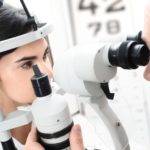
About the Findings
Researchers from Wills Eye Hospital in Philadelphia reviewed medical charts of nearly 2,000 patients age 40 or older with type 1 and type 2 diabetes. They found that six out of 10 people skip the recommended annual dilated eye exam, which can detect eye conditions in their early stages. Researchers also found that patients who smoke and those who have less-severe diabetes and no current eye problems were most likely to skip their annual dilated eye exam. The researchers (and eye doctors in general) stress the importance of the exam, as it can detect eye problems before visible symptoms have occurred. In the case of glaucoma, for instance, many people are not aware that they have the condition until permanent vision loss has occurred. According to the American Academy of Ophthalmology, having a dilated eye exam yearly (or as recommended by an eye doctor) can prevent 95 percent of diabetes-related vision loss.
What to Expect from a Dilated Eye Exam
During a dilated eye exam, your eye doctor will use dilating drops to enlarge your eyes’ pupils. Your eye doctor will use various instruments to evaluate the health of the inside of your eyes. Dilating drops usually take about 20 to 30 minutes to start working. Once your pupils are dilated, you will be sensitive to light and you may notice difficulty focusing on objects up close. We recommend bringing a pair of sunglasses to wear after the exam to minimize glare and light sensitivity on the way home. The effects can last for several hours.
If you are diabetic and would like to schedule a dilated eye exam or discuss your eye health, please call Island Eye Surgicenter at (516) 877-2400.
